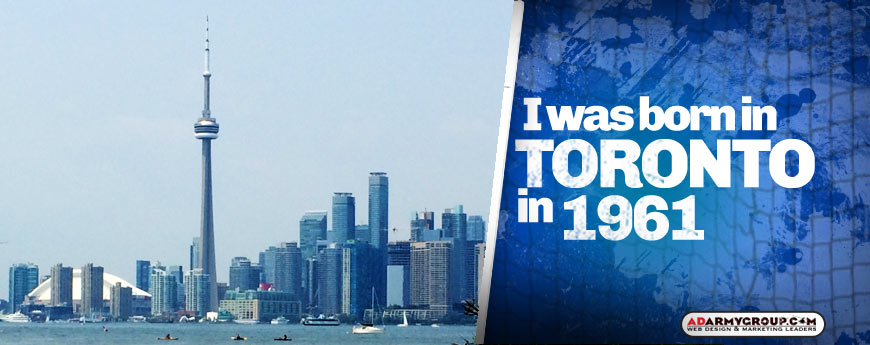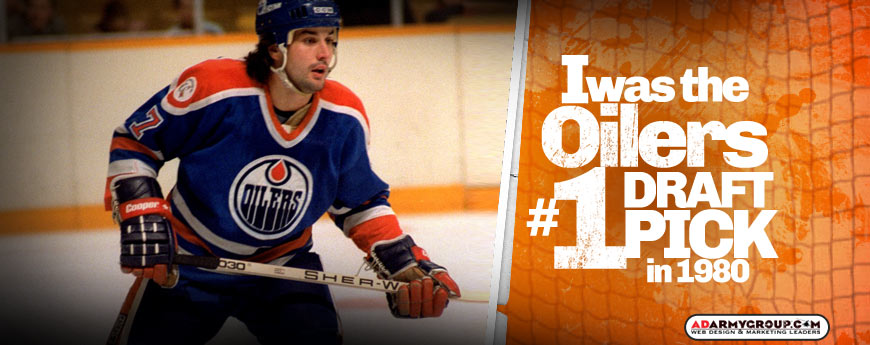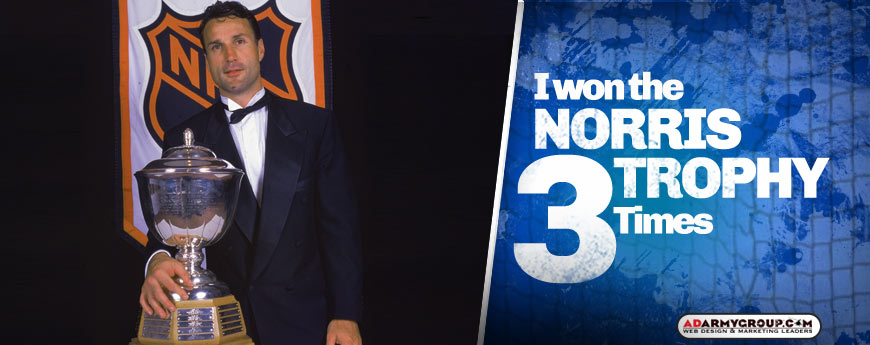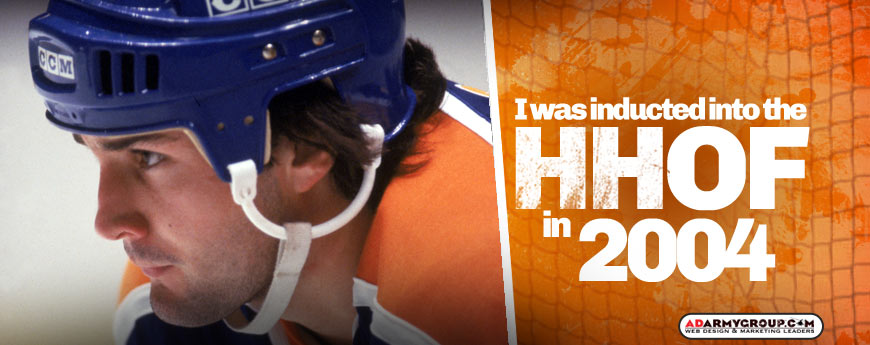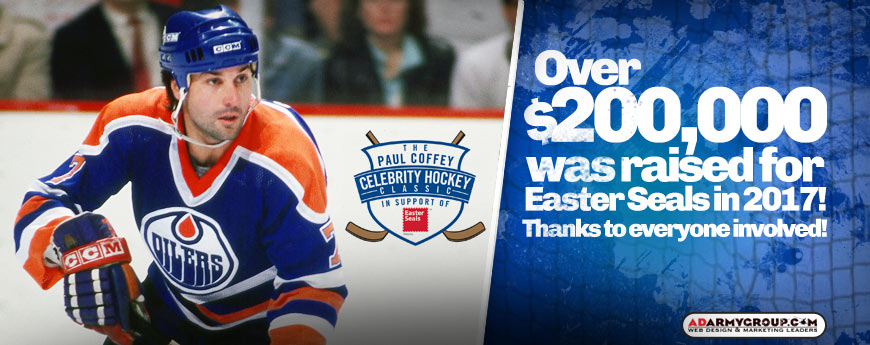Paul's Biography
Throughout his career, Paul Coffey exemplified everything an offensive defenseman can be. He was a smooth and incredibly fast skater, had a booming shot from the blue line that terrified opposing goaltenders, and was able to use his excellent hockey sense and playmaking skills to confuse the opposition and set up teammates. Paul Coffey was born in Weston, now a part of Toronto and raised in the Malton neighbourhood of Mississauga. At the age of 16, Coffey would play for Tier II Jr. A North York Rangers, netting 47 points in 50 games. Coffey would also make his OHL debut this season, appearing in 8 games with the Kingston Canadians.
The following year, Paul Coffey would jump to the Major Junior ranks full time, skating with the Sault Ste. Marie Greyhounds. As a 17 year old rookie, Coffey would net 17 goals and 72 assists for 89 points in 68 games. The following season, after netting 31 points in his first 23 games with the Greyhounds, Coffey was dealt to the Kitchener Rangers. Coffey would finish the season appearing in 52 games for Kitchener, scoring 19 goals and 52 assists for 71 points. Coffey’s combined total of 102 points in 75 games between the Greyhounds and Rangers made him 1 of the most sought after defensemen heading into the 1980 NHL Draft. The Edmonton Oilers would draft Coffey with their 1st round pick, 6th overall.
Coffey would enter the NHL as a 19 year old rookie in the fall of 1980, joining an Edmonton Oilers team loaded with young stars. Coffey would join the likes of Wayne Gretzky, Mark Messier, Jari Kurri, Glenn Anderson, Kevin Lowe and Andy Moog. Scoring 32 points in 74 games in his first NHL campaign, Coffey stepped it up in the playoffs for the Oilers, netting 7 points in 9 games. In Coffey’s second season in Edmonton, he’d establish himself as an elite NHL defenseman, scoring 89 points in 80 games. Despite the addition of young goaltender Grant Fuhr, the Oilers were eliminated in 5 games at in the 1982 playoffs. In the 1982/83 season, Coffey upped his point total to 96 points in 80 games. In the playoffs, Coffey’s 14 points in 16 games helped the young group of Oilers to their first appearance in the Stanley Cup Final. However, they’d lose to the dynasty New York Islanders, who’d claim their 4th straight Stanley Cup, in 4 games. The following season, Coffey exploded offensively, scoring 40 goals and 86 assists for 126 point in 80 games. Coffey became the second defenseman ever, after Bobby Orr, to score 40 goals in a single season.
Coffey’s 126 points also placed him 2nd in the NHL scoring race, behind teammate Wayne Gretzky. In the 1984 playoffs, Coffey would score an additional 22 points in 19 playoffs games, helping the Edmonton Oilers reach the Stanley Cup Final for a second straight year. Once again, the Oilers would face the New York Islanders. After splitting games 1 and 2, the Oilers would win 3 straight games to win their first Stanley Cup, in game 5. The following season, 1984/85, Coffey posted similar numbers, scoring 37 goals, 84 assists for 121 points in 80 games. The Oilers would win their second straight Stanley Cup, defeating the Philadelphia Flyers in 5 games. Coffey would score 12 goals, 25 assists for 37 points in 18 playoff games. This would set a record for goals, assists and points by a defenseman in a single playoff year.
Coffey’s solid defensive play coupled with his offensive prowess earned him his first Norris Trophy as the NHL’s top defenseman. Coffey would continue his record setting ways into the 1985/86 season, 48 goals, 90 assists for 138 points in 79 game, breaking Bobby Orr’s record for most goals in a season by a defenseman. Coffey would also set a number of other records this season, including most short handed goals in a season by a defenseman, with 9, most points in a single game by a defenseman, with 8, most assists in a game by a defenseman, with 6 (although this is tied with 4 others) and longest point streak by a defenseman at 28 games. Coffey would claim his 2nd Norris Trophy at season’s end. Despite all his individual success, the Oilers were not able to replicate the success from the previous 2 seasons, as they were eliminated by the Calgary Flames in the 2nd round of the 1986 playoffs. The Oilers would return to the pinnacle of the hockey world in 1987, defeating the Philadelphia Flyers for a second time in the Stanley Cup Finals, winning their third Stanley Cup in 4 years. Coffey, however, would not be around for the Oilers’ forth Stanley Cup Championship in 1988, as he would be traded to the Pittsburgh Penguins in the 1987 offseason.
Coffey would play for the Penguins for 4 1/2 seasons, breaking the 100 point plateau for the last 2 times in his career during that stretch. During the 1990/91 season, Coffey would become the 2nd ever defenseman to record 1000 points, achieving this in a record setting 770 games. Coffey would help Pittsburgh win the 1991 Stanley Cup, the franchise’s first. Shortly after passing Denis Potvin as the NHL’s all time leading scorer by a defenseman in 1992, Coffey would be traded to the Los Angeles Kings, where he would be reunited with former Oilers teammates Wayne Gretzky and Jari Kurri. After a brief stint in LA that lasted 50 games, Coffey was on the move again, this time to the Detroit Red Wings. Coffey would enjoy a productive 3 1/2 seasons in Detroit, with his best season as a Red Wing coming in 1994/95. Coffey accumulated 58 points in 45 games during the lockout shortened season, earning his third and final Norris Trophy.
Coffey would help the Red Wings reach the Stanley Cup Finals, ultimately losing to the New Jersey Devils in 4 games. Coffey would remain with the Red Wings until 1996, when’d he be traded to the Hartford Whalers as part of the deal that landed Brendan Shanahan in Detroit. After just 20 games with Hartford, Coffey was traded again, this time to the Philadelphia Flyers. He’d make another appearance in the Stanley Cup Finals with the Flyers, but was ultimately loss to his old teammates in Detroit. After 1 more season with the Flyers, Coffey would have a 10 game stint with the Chicago Blackhawks, after which he’d play with the Carolina Hurricanes through the 1999/2000 season. Coffey would finish his career with the Boston Bruins in 2000/01.
To this day, Paul Coffey sits second all time in NHL history to only Ray Bourque in goals, points and assists by a defenseman. In recognition of his outstanding career, Paul Coffey was inducted into the Hockey Hall of Fame in 2004. Paul Coffey currently lives in the Toronto area with his wife Stephanie and their 3 children.
